TRIBUTE
A farewell letter to Frene Ginwala — a feminist friend and comrade
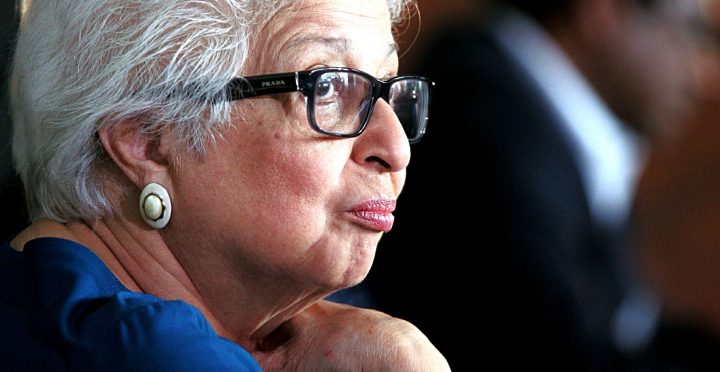
Dear Frene — At 90, your heart remained that of the courageous 28-year-old who joined the fight for freedom and helped ensure the safe passage of ANC leaders like OR Tambo.
In exile, you refused to be a subordinate secretary taking notes while men spoke. Instead you, with other powerful ANC feminists, ensured that his speeches and other key documents addressed not just class and race, but also gender oppression, and committed to both non-racism and non-sexism.
You analysed the world and acted to change its injustice.
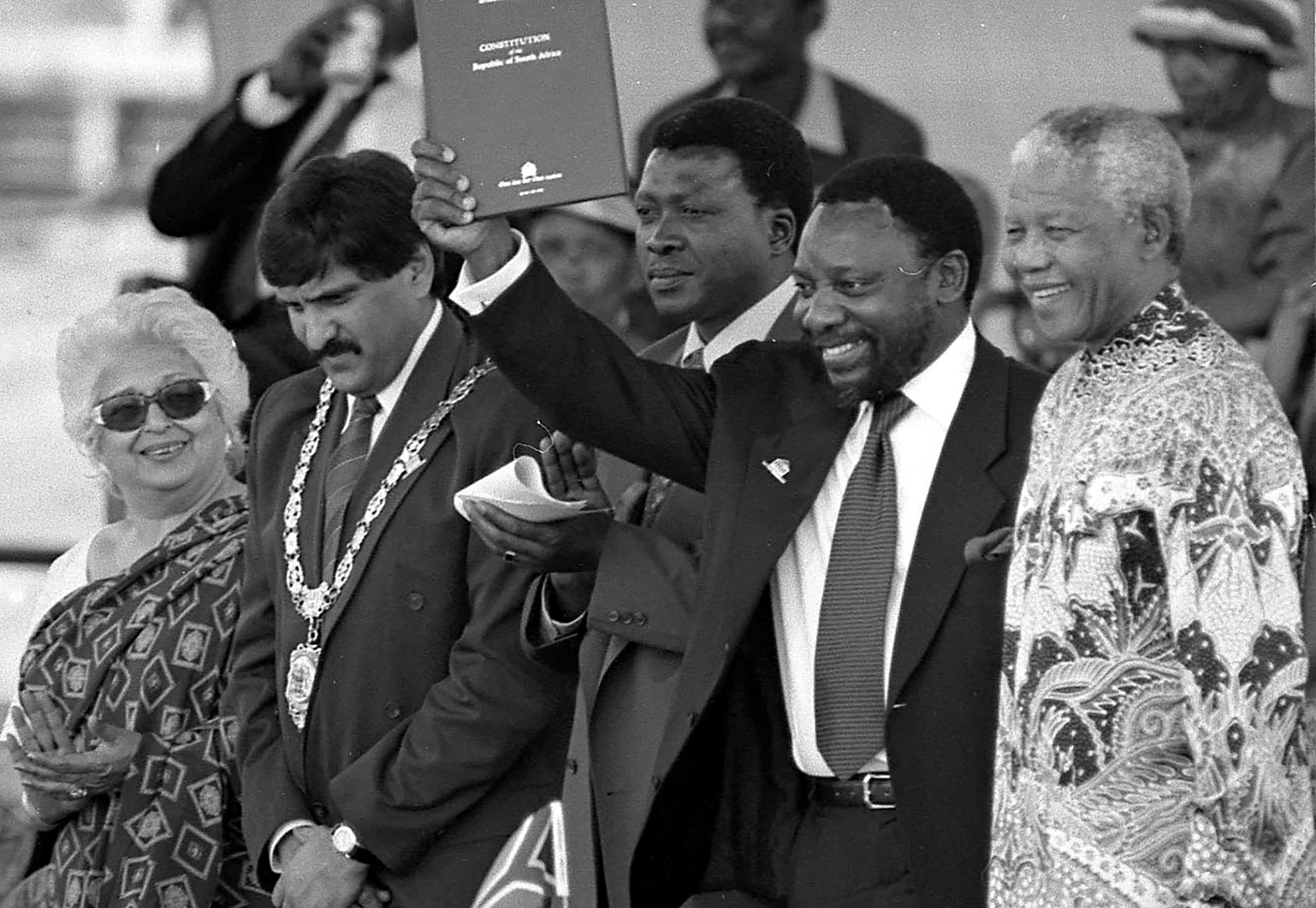
May 1996: The signing of the Constitution of the Republic of South Africa in May 1996 ushered in a new era of constitutional democracy two years after the country’s historic first democratic election and the installation of President Nelson Mandela. In this photograph, Frene Ginwala, Cyril Ramaphosa holding aloft the signed copy of the Constitution, and Nelson Mandela. (Photo: Gallo Images / Business Day / Robert Botha)
You were an internationalist standing in solidarity with countries fighting for freedom, including Palestine, against Israel’s apartheid.
After 1994, you presided over a secular democratic Parliament that instituted a moment of silence in which, in Mandela’s words, we could “use the silence… to make us understand how precious words are and how real speech is in its impact on the way people live and die”.
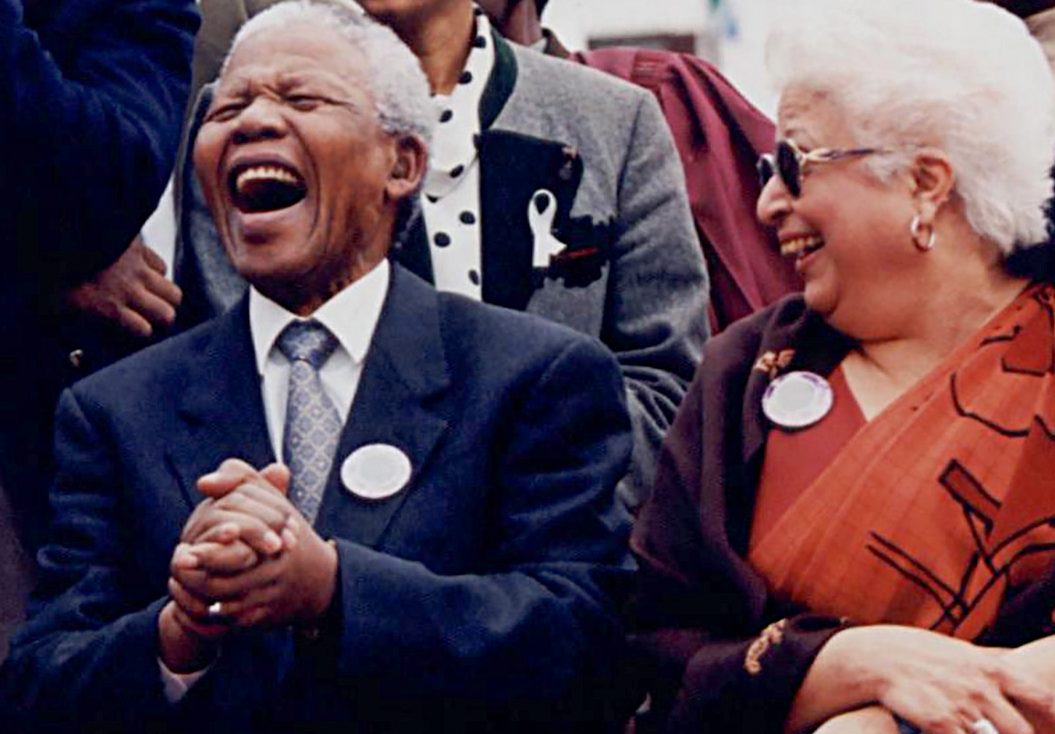
South African president Nelson Mandela shares a light moment with Frene Ginwala (Photo: Gallo Images / Die Burger)
In silence, we can overcome fear and think critically and creatively. We can learn to listen to and trust ourselves, and each other. We can reconnect to the dignity inherent in every single one of us — recognised as our Constitution’s first founding value, alongside equality and social justice.
The greatest tribute we can pay you isn’t to deify you or put you on a pedestal — you would have hated that and would have said so.
You would want to focus on policy options, captured in your writings, for our country to transform the patriarchal, capitalist, apartheid state’s spatial geography that still traps millions in brutal poverty. And the principles and values needed to achieve this.
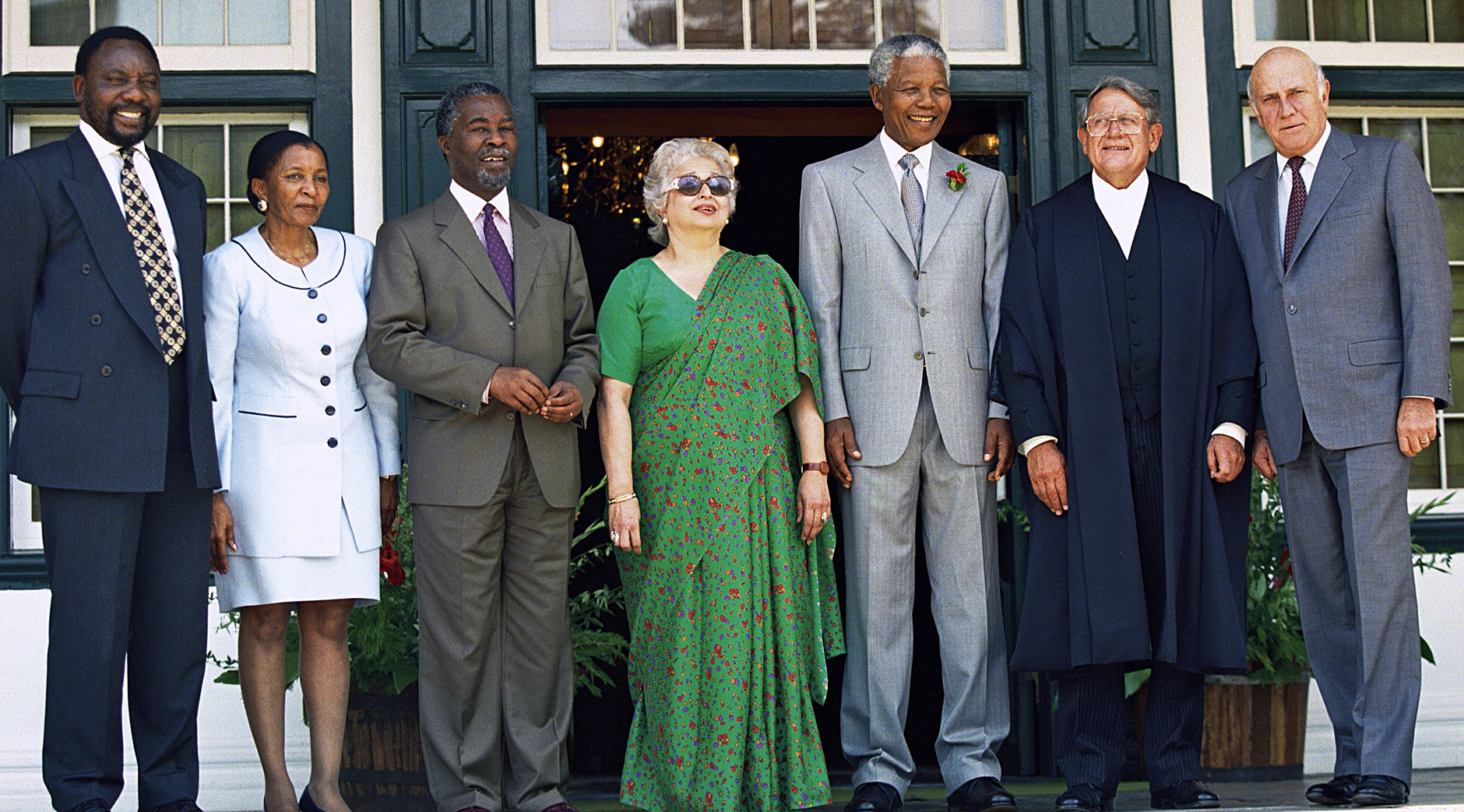
1996, Cape Town. From left: Cyril Ramaphosa, Zanele Mbeki, Thabo Mbeki, Frene Ginwala, Nelson Mandela and FW De Klerk (far right) at the opening of Parliament. (Photo: Gallo Images)
You were a historian who worked to record the role and relevance to the present of Black women’s powerful challenges to colonialism and economic injustice — Herstory.
Your paper (with MacIntosh and Massey), entitled “Gender and economic policy”, should be read by every economist and anyone who wishes to understand the structural causes of gender oppression, that increase poverty, precarious employment, unemployment and patriarchal violence.
When the priority of economic growth in profits, for a few, decreases spending on social security, health and education, women’s gendered, hidden work increases, with devastating effects for women’s health and those dependent on her care, in a world in which men need to, but do not equally share the burden of childcare and housework.
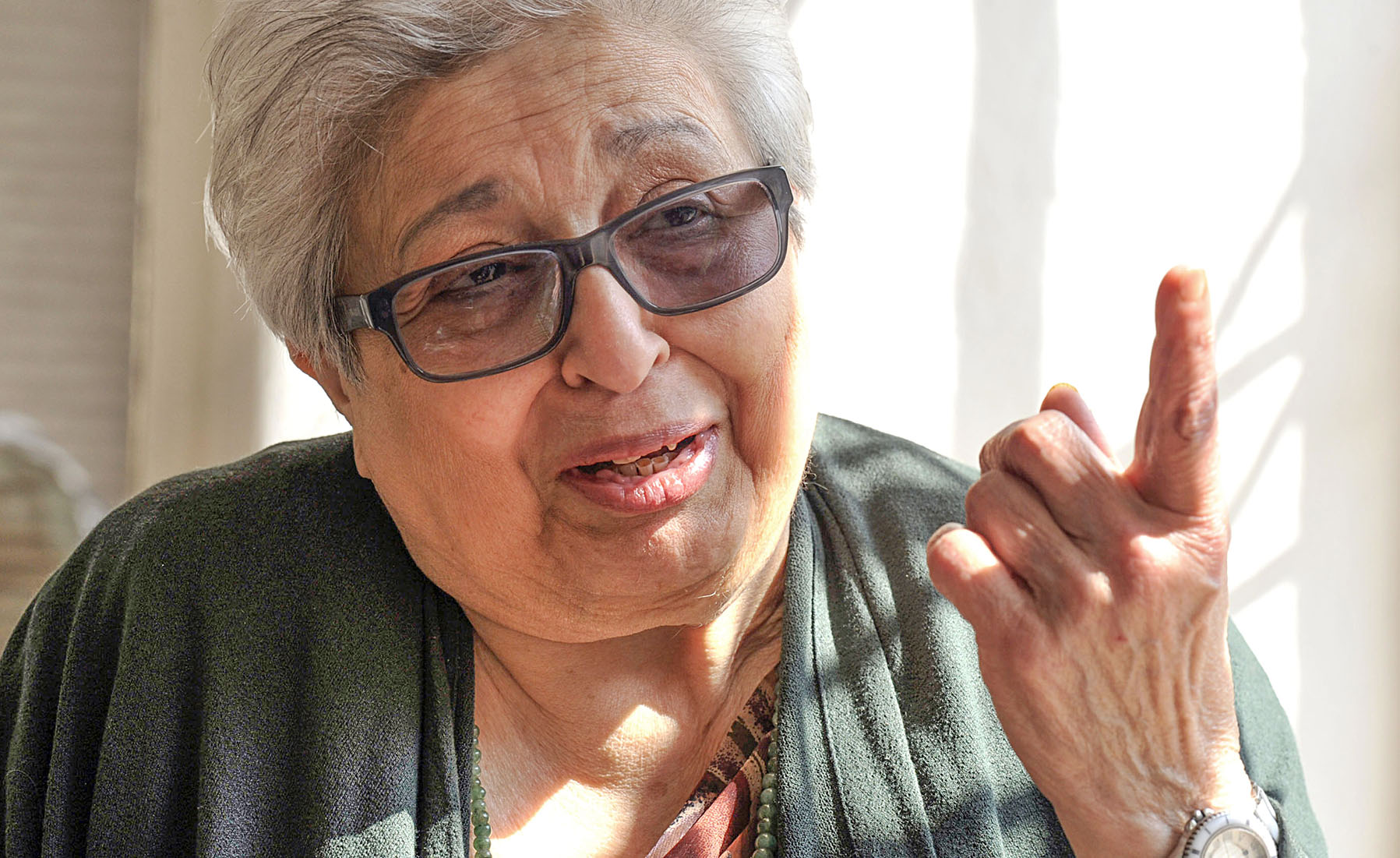
Frene Ginwala, first speaker of Parliament in a democratic South Africa during an interview at her home on September 18, 2015 in Johannesburg. Ginwala spoke of South African heritage, saying that she identified with being a South African. (Photo: Gallo Images / City Press / Lucky Nxumalo)
Economic policy-makers need to recognise and value women’s unpaid contribution to the economy, that kept and keeps families and communities alive, when they should be dead, (according to the devastating statistics on food security and hunger).
To understand why and who is most vulnerable to gender-based violence, look at the streets that have no lights; look at the homes that have no toilets; look at those who have to go in search of clean drinking water; look at those reliant on unsafe transport after working in precarious conditions late into the night… understand misogyny in public and private sector policy — that is what Frene would have demanded that we do.
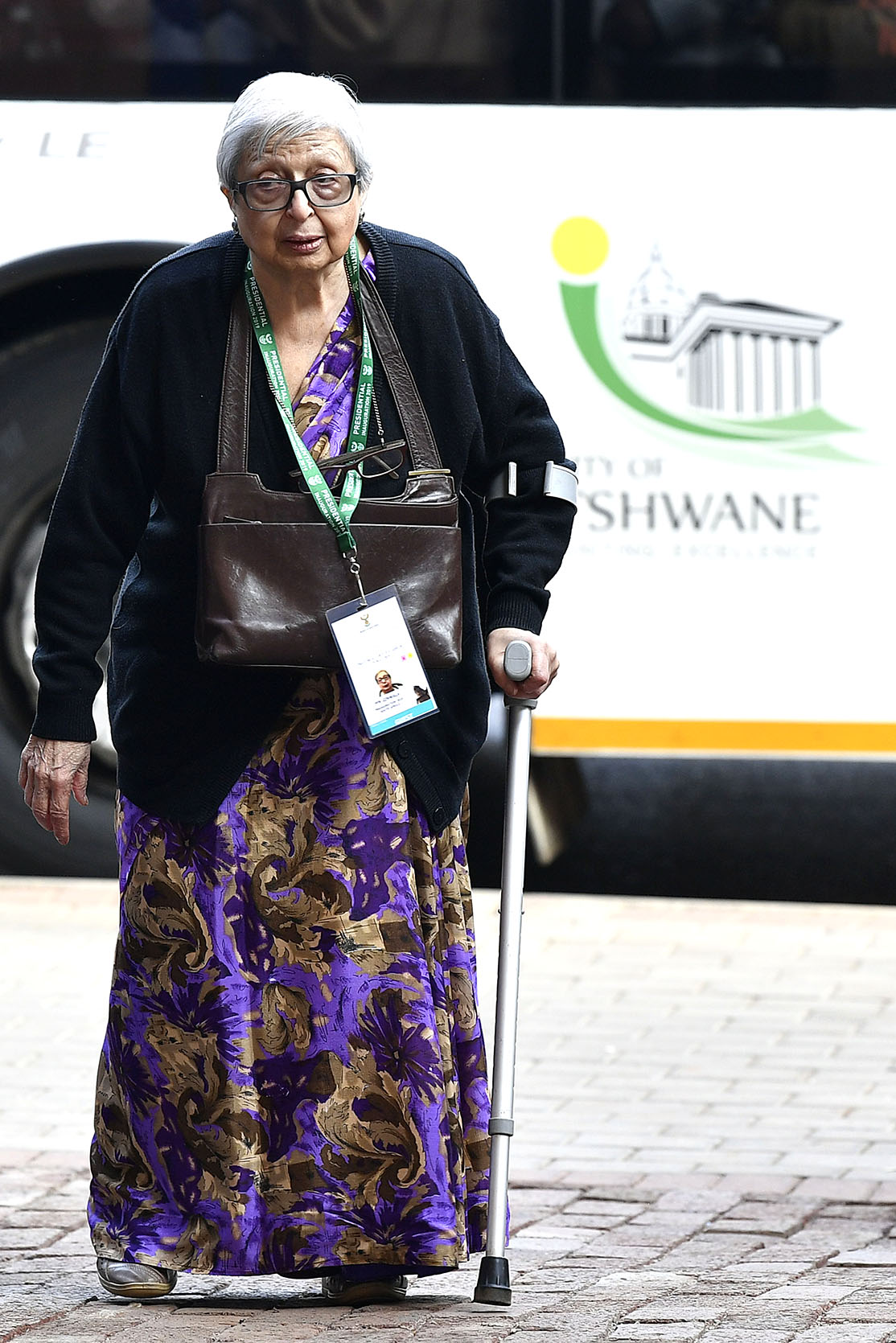
Frene Ginwala during the inauguration of President Cyril Ramaphosa as head of state of the Republic of South Africa at Loftus Versfeld Stadium in Pretoria on 25 May 2019. (Photo: Gallo Images / Frennie Shivambu)
Dear Frene, you were the visionary who convened the Women’s National Coalition in early 1992. In response to SA’s male-dominated transition, you united 90 national organisations and hundreds of local organisations in regional coalitions — across party and other divides.
At the end of that year, you poached the young founding co-ordinator of the Worker’s College. Your brief was to help the Coalition conceptualise and manage, in one year, a massive participatory research campaign which you dubbed “Big Ears”.
The Coalition went to rural areas, supporting women in forming regional coalitions where there had been none, and supporting the Rural Women’s Movement protest at Codesa.
The Coalition’s teams of legal, research and media experts you persuaded, with your usual charm, to freely volunteer their time and expertise, supported women negotiators when traditional leaders in conservative parties argued against gender equality.
An estimated two million women participated and contributed to the Coalition’s campaign. Our shared commitment, despite the differences we argued about (and there were a few of those!), ensured the campaign secured the necessary political will.
The demands of the Coalition’s Women’s Charter are reflected in SA’s final Constitution and guided the work of our Committee on Women.
We wanted a democracy that ensured substantive equality, justice, democracy and freedom for all. After your passing, I listened to a recording of a 2018 conversation we had about Parliament’s book series of personal reflections on the constitution-making process.
We laughed a lot amidst serious reflection — alert to the massive challenges, including persistent class, race and gender inequality. You were proud of what we’d achieved in Parliament; especially the work of Parliament’s Committee on Women (that you’d initiated and I’d chaired), that held hearings with rural women and ensured Parliament enacted 80% of its legislative priorities.
We’d pushed for women’s paid and unpaid, unvalued work to be counted by Stats SA. You were particularly animated about the Women’s Budget, which the Finance Committee’s working group that I’d convened on gender and macroeconomics initiated with NGOs.
In an international speakers forum, you boasted about the significant impact that using the first budget debates to propose the Women’s Budget had on our budget, which influenced many other countries.
By 2002, my opposition to government policy — on GEAR, the arms deal and HIV and Aids, through committee hearings; the ANC caucus and the budget vote that preceded my resignation — wasn’t easy for you to publicly align with.
Normally, MPs took their leave from the National Assembly and the people of SA in a public debate. The ANC Whip, whose instruction I’d ignored not to mention HIV/Aids in the International Women’s Day debate, ensured that this opportunity was removed.
Yet you addressed my farewell event (held in a dining hall outside the National Assembly) in your capacity as the Speaker of Parliament. I felt your deep respect, love and shared commitment.
Visit Daily Maverick’s home page for more news, analysis and investigations
If there is an afterlife, I hope that you and two other powerful feminist sisters who died in this same fortnight, Pethu Serote and Myrtle Witbooi, are dancing, laughing and celebrating your collective love, courage and insubordination.
Today I wear a sari, Frene, to honour you.
You knew the power and danger of culture in a country in which a brutal Apartheid state had co-opted culture to foster narrow, parochial ethnicities and nationalisms, racism, misogyny and xenophobia.
Fascist leaders and states across the world continue to do this, pitting people against each other instead of addressing the root causes of increasing inequality, poverty, violence and the climate crisis.
In 1994, you — a Black woman of Indian descent, in Apartheid’s previously almost all-male, all white-Parliament — stepped into the most powerful position in the House, wearing a sari that reclaimed culture as celebratory and liberating.
In that Speaker’s Chair, you sat solid above me as I shared the country report we’d edited for Beijing to include Black women in Apartheid’s Bantustans (who’d been excluded in Apartheid statistics), for gender responsive budgets, for abortion, against gender-based violence, for counting and valuing women’s unpaid, unrecognised contribution to society.
I felt you quietly beaming your support, as I feel it now.
Hamba kahle, beloved Frene — your life touched and inspired me.
May it inspire future generations to work across generational and other differences towards the world of our dreams. DM/MC
This tribute was presented at the State Memorial for Dr Ginwala.





















 Become an Insider
Become an Insider
Comments - Please login in order to comment.